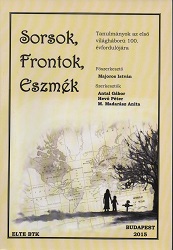A nagy háború gondolata a dualizmus kori utópisztikus és sci-fi irodalomban
The Idea of the Great War in the Science-fiction and Utopien Litterature of the Dualism
Author(s): Miklós Veres
Subject(s): Cultural history, Comparative history, 19th Century, Pre-WW I & WW I (1900 -1919)
Published by: Eötvös Loránd Tudományegyetem, Új-és Jelenkori Egyetemes Történeti Tanszék
Keywords: science-fiction; utopian lirerature; invasion literature; future wars;
Summary/Abstract: The modern Hungarian science-fiction and utopian literature was born and attained its majority after the Compromise of 1867. The novel of Mór Jókai, A jövő század regénye [The Novel of the Next Century] (1872-1874) was the first of Hungarian utopian novels to present a modern technicised war, which transforms both Hungary and the world. The followers of Jókai (Pál Privigyey, Gyula Farkas) share the same views; the great wars of the future are fought with the help of technical and scientific discoveries. After the turn of the century, in the shade of the forming federal systems, the writers placed the break out of the war in tangible proximity instead of the distant future. (Maritimus: Nagy Háború, [Great War] 1909; Ábel Barabás: A jövő évtized regénye, [The Novel of the Next Decade] 1910). In my study besides the analytical introduction of the war-time future depiction of the texts I show how they fit into the international „invasion” literature, which became popular with the novel of George Tomkyns Chesney entitled Battle of Dorking (1871) and which was fulfilled with The War of the Worlds by (1898) H. G. Wells.
Book: Sorsok, frontok, eszmék. Tanulmányok az első világháború 100. évfordulójára
- Page Range: 475-486
- Page Count: 12
- Publication Year: 2015
- Language: Hungarian
- Content File-PDF

